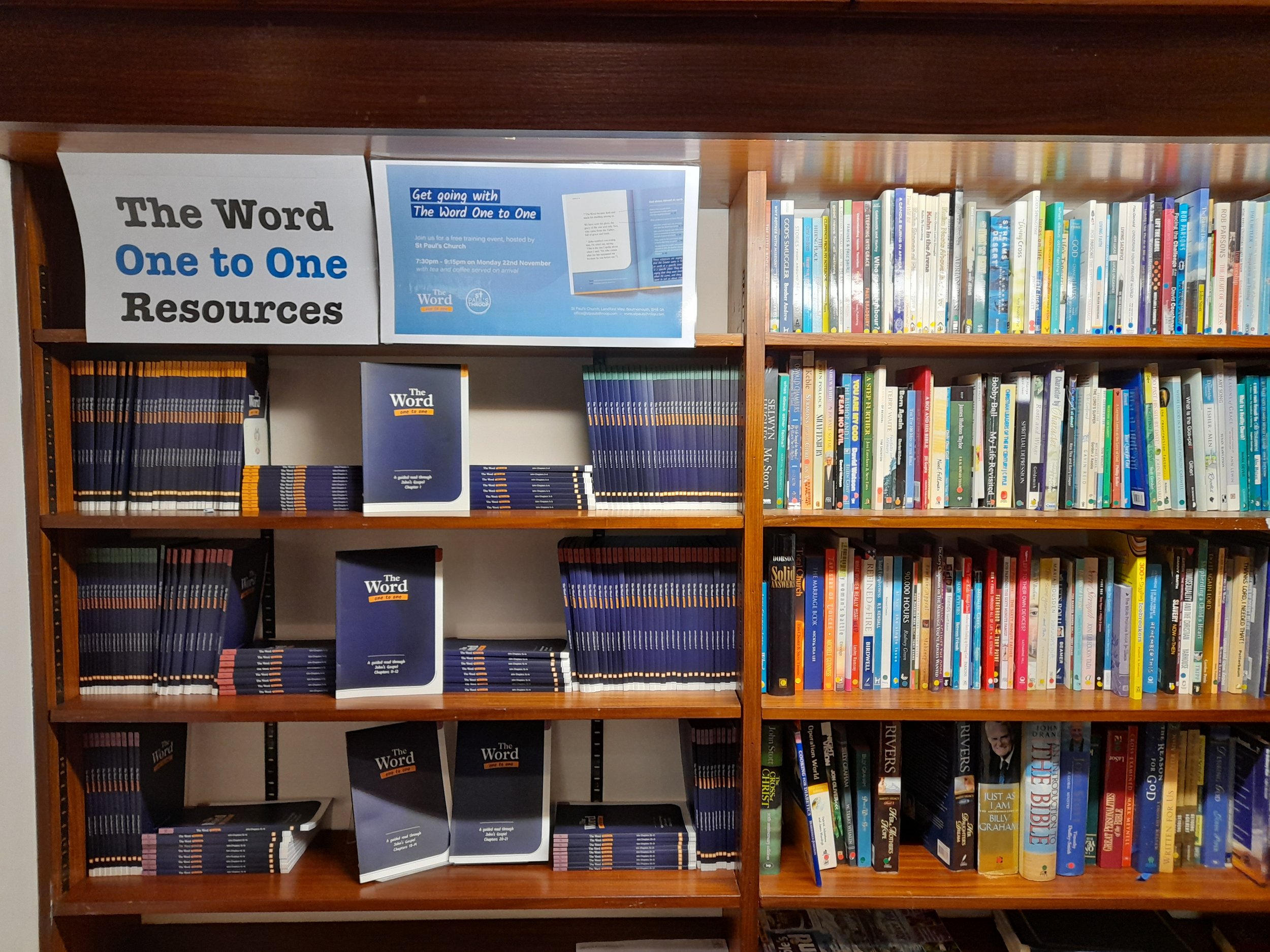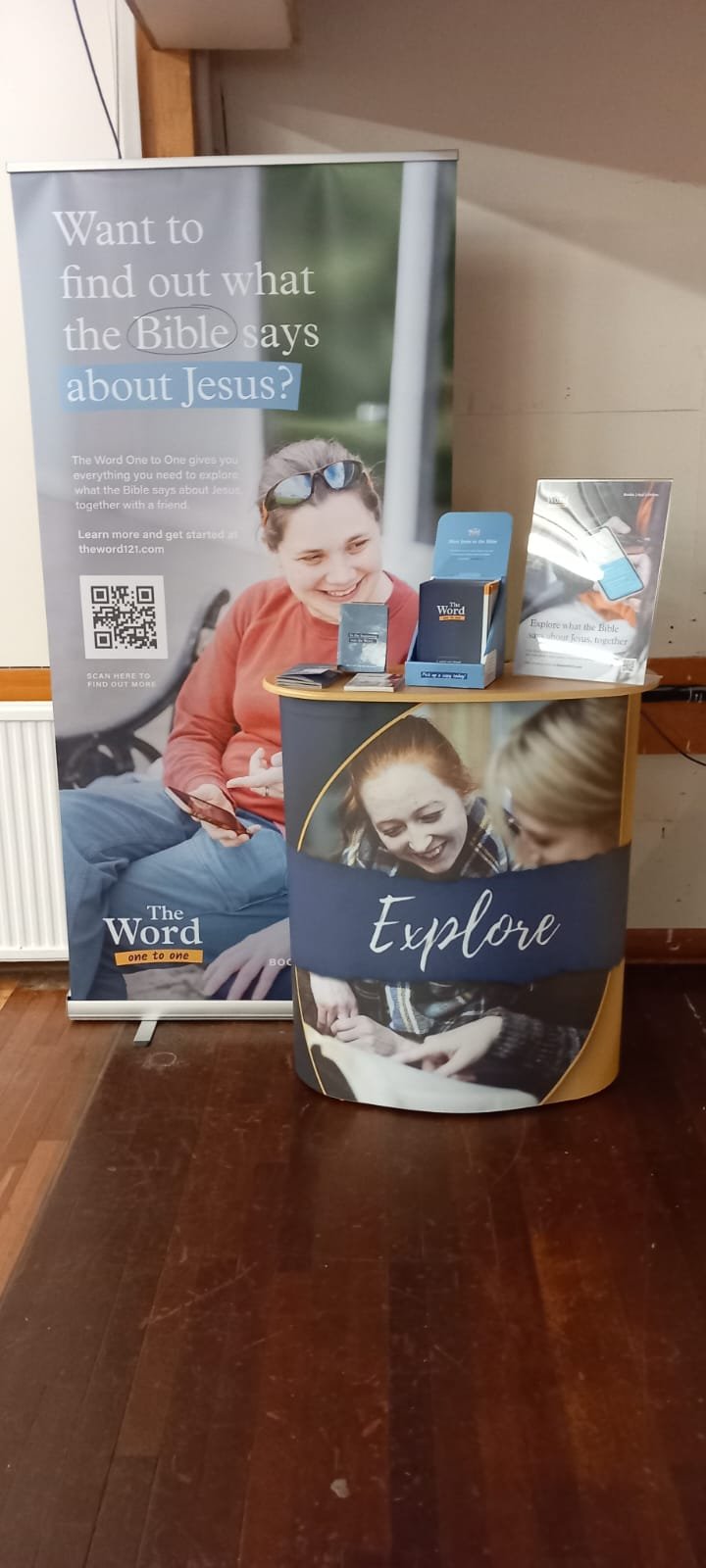A playbook for keeping Bible sharing on our churches’ agenda
Christine Armstrong shares ten practical ways to build momentum and support your church family in sharing God’s Word with others.
Pointing people to Jesus is something that any Christian can do, especially with a powerful resource such as The Word One to One. Many who discover it say they find it a liberating and joyful thing to read the Bible with others.
“Sharing God’s Word has liberated me in evangelism more than anything else.”
We all need help and encouragement. Even if you have introduced The Word One to One to your church family, we all need reminders of why we are to do the work, and of the Lord’s presence with us as we do it.
So here is a little playbook of practical ideas for how to keep Bible sharing on the agenda and build momentum in embedding it into the culture of your church. As is the case for sport, life is unpredictable and there is no template for guaranteed success! But having these plays up your sleeve as you lead the church week in and week out should help you be better prepared to inspire people to get going and support those in your church who are sharing God’s Word with others.
Many church leaders have found it helpful to ask a passionate person with capacity to take the lead on the day-to-day practicalities to ensure Bible sharing stays on the agenda using the ideas below.
Equip
Play 1: High-profile training
Let’s start with the obvious, and that is training sessions that aim to encourage, equip and commission brothers and sisters to share God’s Word.
These can be church-wide, or focused on one ministry at a time.
From time to time, it’s worth getting the whole church together, or using the small group or homegroup network to equip the entire church.
The Word One to One provides free training resources enabling you to run this yourself, or in some cases we can provide regional trainers to run these sessions with you.
You may think of other creative ways to do this. For example, we’ve heard of one church putting a book spread up on the screen in a Sunday service with two people going through it together at the front for 5 minutes so everyone could see the resource and how to use it.
Don’t be afraid to encourage people to try it out by practising with someone from church or at home so that they can grow in confidence with the resource and experience of reading with someone else. Like learning a sport or musical instrument, we learn by giving it a go and practising. Suggest that they pray together for God to lead them to those who may not yet be Christians and invite them to read a bit of the Bible together.
Play 2: Drop-in training sessions or after-service huddles
We’ve found that an initial training session will get some people going but in order to build momentum it shouldn’t be a one-off: new people join, circumstances change, people forget and by God’s grace people grow in maturity and confidence for evangelism.
Offering occasional, optional drop-in training sessions for those who would like a refresher or who are new to Bible sharing, not only keeps it on the agenda but helps new people get going regularly, and allows those who are less confident to have various nudges along the way.
The Word One to One hosts regular online training sessions to which you can invite congregation members – take a look at which events are coming up.
Or consider planning in a simple huddle together for 15 minutes straight after a Sunday service, with an experienced Bible sharer sharing a story or two, demonstrating how the resource works and helping people think about who and how to invite. These simple initiatives can work powerfully to mobilise Bible sharers.
Play 3: Personal coaching
Some of the most fruitful times of equipping can be showing people the resource and how it works personally. Be ready to do this as you catch-up with people for example and if their mission field or someone they’re witnessing to naturally comes up in conversation. Having the app makes it easy to demonstrate anytime. It’s a great idea to do this as part of an induction process for new people too e.g. staff team members or serving church members.
Enable
Play 4: Keep it visible
Many churches choose to provide The Word One to One books for free to encourage the church family to give it a go.
Having a display area where The Word One to One is visible in your church serves as a reminder to everyone that Bible sharing is something they can do, and may even draw the eye of those who are new to church as something they might enjoy.
Here are some other ideas for how you can keep The Word One to One visible:
Throw a reminder slide into your rolling slides on a Sunday
Play a video occasionally
Put up a poster or pull-up banner
Add a page to your website
Include taster booklets or flyers in your giveaway areas for visitors
Take a look at our church resources – we will continually add to this page as new resources become available.
And check out these examples from active Bible sharing churches:
Play 5: Match-making and/or launch people
We’re not talking about Christian dating here! We’re talking about keeping your eyes open for opportunities to connect people to read together. Don’t just wait for the next course you’ll run.
We’ve often seen that believers can need a push to get started, but once they read with one person, they’re more confident and excited to see God’s Word in action and want to read with others.
You will be doing both the potential Bible sharer and the person you are connecting them to a great favour. Look out for:
Newcomers: a great way to help new people form relationships and to find out where people are at spiritually. This could even be offered at newcomer events.
People on the fringes of church life: either new to Christian things or a bit detached from them. Perhaps they are engaging with your community ministries such as toddler groups, food banks, debt help etc. Often what they most need is for someone to come alongside them, to love them, to help them connect with what is going on at church, and to read and chat about God’s Word with them.
Fragile/older folks: what a wonderful service to someone advanced in years, to get alongside them and help them see the wonders of the Lord Jesus and the glory of His gospel, perhaps even for the first time!
Older teenagers/young adults: what those growing up in our churches need most is relationship and Christian role models. How wonderful then if mature and godly adults can get alongside them in a relationship that is centred on the Lord Jesus as revealed in God’s Word.
Children and grandchildren: don’t forget the low hanging fruit of our own family members. They are in our homes each day and should be our discipleship priority. What a blessing to be enjoying God’s Word with each other.
If they need some help to get started, someone more confident could join them for the first episode or two, and then leave them to carry on once they’ve ‘been launched’ and have seen how easy it is to read and chat through. You can always leave the door open to help them with any tricky questions that may come in the future. It’s great to check in occasionally and to pray for them too.
Play 6: Follow up at events and courses
Often, people attending events and courses are captivated by Jesus but aren’t yet ready to come to church or to make a commitment to Christ.
In the lead up to your events, encourage the Christians to invite the friends they brought to look at the first episode of The Word One to One with them. Tell people at the events something like, “If you have a Christian friend, ask them to read it with you. If you don’t have a Christian friend come and speak to me or get in touch with a member of the team and we would love to find someone to read with you.”
Have a list of people ready who are willing to read with others.
After courses or events, you could even add it as an option to response cards/feedback forms – find out more here.
Play 7: Seasonal plays
Remember to factor in how Bible sharing can help you make the most of the seasonal opportunities.
We know of churches gifting copies of John book 1 at Christmas to those connected with community ministries like English classes or toddler groups, along with a letter inviting them to read with someone in the new year.
Other churches often use the Taster Booklet – which covers John 1:1–18 in The Word One to One style – at Christmas as a giveaway with the offer of reading on.
Encourage
Play 8: Surface a story
It’s so simple, but I find it so easy to forget to tell the stories of sharing God’s Word.
Sharing stories is a sure-fire way to build plausibility that evangelism and specifically Bible sharing is not just a nice theory, but something that’s actually happening!
Hearing that other people are doing it can inspire people that it’s something they can do too and it can stimulate some conversation.
And who doesn’t love hearing encouraging stories of God at work!?
It doesn’t have to be a massive story where someone’s come to faith, it can be a micro encouragement:
When you hear of someone in the congregation sharing the gospel, or asking someone to read the Bible with them (even if the invitee said ‘no thanks’), or sharing a Bible truth…
When you have had such a conversation yourself…
When you hear of explorers discovering something new about Jesus…
…capture those stories and think about the best way to play them out to the rest of the congregation:
Perhaps you can share them on WhatsApp or a closed Facebook group, or include a sentence or two in the weekly email
Perhaps you can share it as an encouragement as you open the service, prayer meeting or even as part of your sermon
From time to time you could even do a short interview or a video that allows the person to share with the rest of the congregation in a prayer meeting or service. Perhaps you could tie it into someone doing the Bible reading or prayers.
St Paul’s Throop, Bournemouth did a printed newsletter with four Bible sharer stories:
We publish stories from the wider community on our YouTube channel, so please subscribe to that and play those testimonies out to supplement your own stories.
Play 9: Sermon spurs
Remember to not just apply the sermon to the believer’s heart – seek to ‘equip the saints for the work of ministry’, and help them know that that is what you are doing.
For example, when teaching John 5:24: ‘Very truly I tell you, whoever hears my word and believes him who sent me has eternal life and will not be judged but has crossed over from death to life’:
You may want to help believers marvel at the fact that God’s judgement is now behind them, rather than in front of them
You may also want to help current and future Bible Sharers see how amazing it is to share Jesus’ words and the potential eternal impact it might have!
Or, when teaching the Parable of the Sower
You may want to encourage the hearer of Jesus’ words to take care how they hear – and to warn them of the cares of this world and the deceitfulness of riches, etc.
You may also want to encourage current and future Bible Sharers to have realistic expectations for the people they are reading the gospel with. Some will reject, some will initially be excited and walk away, some will be transformed and become a transforming influence in the lives of others. That means it’s SO worth it!
Remember, you are not just ministering to the congregation – you are equipping them to minister to each other and to the people God has placed in their lives.
Play 10: Pray specifically for the front-liners
It’s great to pray generally for people to be saved.
But as Christians learn to pray specifically for each other’s ‘mission fields’:
There is greater empathy and understanding between brothers and sisters about the communities they live in and are looking to reach
There is accountability and mutual encouragement
When people do end up coming to church, those who are praying know how to be sensitive to the newcomer and can help welcome them
Above all, of course, our Father answers our prayers!
To respect people’s privacy, the central prayer meeting may not be the best place to pray for individuals by name. Help church members find a format where they can pray regularly and specifically for the people they are ministering to:
For some churches, small groups or homegroups might be a good fit
Other churches arrange specific ‘prayer groups’ or ‘prayer triplets’ – 3 to 5 people teaming up to commit to praying for each other
It’s great to pray for known Bible sharers when you can too.
You may like to lead a prayer campaign at key times of year for example, “2 for 2” – pray for two people for two minutes every day and see what the Lord does! This will be a low entry point for people who are not used to praying for others evangelistically and may be a great talking point amongst church family.
We pray this playbook will be of help to you and your church family as you encourage each other in sharing God’s Word. My job is to encourage and support Christians and churches in Bible sharing so please let us know your encouragements and anything that has worked well for you. You can get in touch here.
Find out more about mobilising your church for Bible sharing.
Recommended Reads














